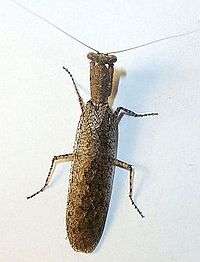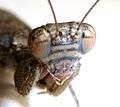Tarachodes
| Tarachodes | |
|---|---|
 | |
| Scientific classification | |
| Kingdom: | Animalia |
| Phylum: | Arthropoda |
| Class: | Insecta |
| Order: | Mantodea |
| Family: | Tarachodidae |
| Genus: | Tarachodes Burmeister, 1838 |
| Species | |
|
Many, see text | |
The bark mantises and ground mantises (genus Tarachodes) are praying mantises of the family Tarachodidae[1] that are native to the Afrotropics. They are generally light brown but more silvery on the wings. The wings are attractively reticulated, and the veins may be mottled dark and pale.[2] The head is wider than the pronotum, which is rounded anteriorly, and doesn't overlap with the rear of the head. The pronotum is depressed, with its sides more or less parallel, and only a weak supra-coxal bulge is present.[3] The anterior tibia are flattened and greatly expanded longitudinally, and the tibial claw does not fit into a pit between the 1st and 2nd external spines of the anterior femora, as in a few mantis groups.[3]
These mantids are ambush predators and many species are cryptically coloured to blend in with their surroundings. Some have brightly coloured undersides which are displayed to startle and drive off assailants. Some species such as Tarachodes maurus brood their eggs, and others, such as Tarachodes afzelii, not only brood their eggs but continue to guard their young after they hatch out.[4]

Face 
Reticulated wings 
Pronotum, front legs 
Full body
Species
Members of this genus may be called Bark mantises[5] or Ground mantises.[6]
- Tarachodes abyssinicus
- Tarachodes afzelli (Tanzanian ground mantis)[6]
- Tarachodes alluaudi
- Tarachodes aestuans
- Tarachodes arabicus
- Tarachodes basinotatus
- Tarachodes beieri
- Tarachodes betakarschi
- Tarachodes bicornis (Two-horned mantis)
- Tarachodes bispinosus
- Tarachodes brevipennis
- Tarachodes chopardi
- Tarachodes circulifer
- Tarachodes circuliferoides
- Tarachodes davidi
- Tarachodes dissimulator
- Tarachodes dives
- Tarachodes feae
- Tarachodes fraterculus
- Tarachodes fuscipennis
- Tarachodes gerstaeckeri
- Tarachodes gibber
- Tarachodes gigas
- Tarachodes gilvus
- Tarachodes griseus
- Tarachodes haedus
- Tarachodes insidiator
- Tarachodes karschi
- Tarachodes lucubrans
- Tarachodes maculisternum
- Tarachodes maurus
- Tarachodes minor
- Tarachodes modesta
- Tarachodes monstrosus
- Tarachodes namibiensis
- Tarachodes natalensis
- Tarachodes nubifer
- Tarachodes nyassanus
- Tarachodes obscuripennis
- Tarachodes obtusiceps
- Tarachodes okahandyanus
- Tarachodes oxynotus
- Tarachodes perloides
- Tarachodes pilosipes
- Tarachodes pujoli
- Tarachodes rhodesicus
- Tarachodes robustus
- Tarachodes rotundiceps
- Tarachodes sanctus
- Tarachodes saussurei
- Tarachodes schulthessi
- Tarachodes severini
- Tarachodes similis
- Tarachodes sjostedti
- Tarachodes smithi
- Tarachodes taboranus
- Tarachodes tananus
- Tarachodes taramassi
- Tarachodes ugandensis
- Tarachodes usambaricus
- Tarachodes vitreus
- Tarachodes werneri
See also
References
- ↑ Catalogue of Life: 2009 Annual Checklist
- ↑ Alan Weaving; Mike Picker; Griffiths, Charles Llewellyn (2003). Field Guide to Insects of South Africa. New Holland Publishers, Ltd. p. 62. ISBN 1-86872-713-0.
- 1 2 Ramel, Gordon. "Family Mantidae: Key to subfamilies". The Earthlife Web. Retrieved 18 December 2014.
- ↑ James T. Costa (2006). The Other Insect Societies. Harvard University Press. pp. 136–137. ISBN 978-0-674-02163-1.
- ↑ List of mantises and common names
- 1 2 Tanzanian Ground Mantis
![]() Media related to Tarachodes at Wikimedia Commons
Media related to Tarachodes at Wikimedia Commons